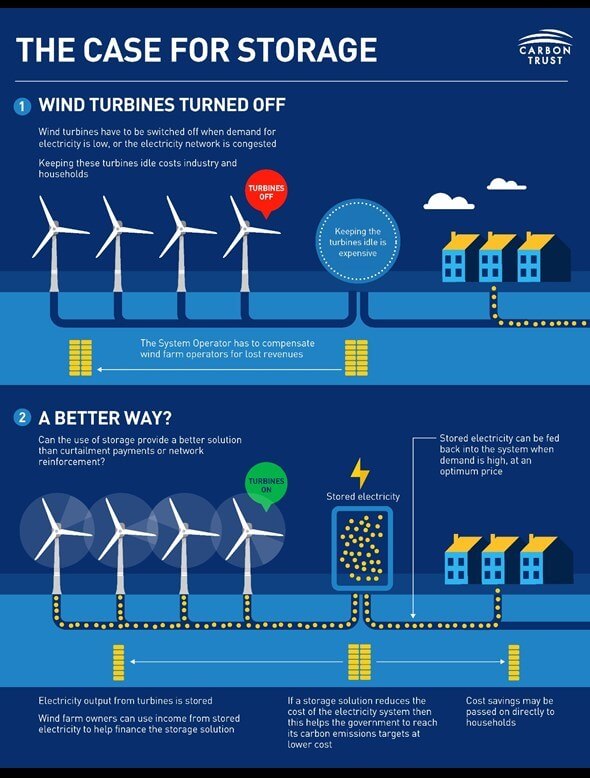Industry comes together to address Britain’s energy conundrum
Collectively, ESIP partners represent almost 50 percent of the electricity supply market in the UK and hold significant renewable energy and conventional generation portfolios. ESIP has also received initial support from the Scottish Government and the Foreign & Commonwealth Office (FCO).
This unique collaboration will enable partners to develop solutions to overcome barriers currently deterring investment in flexibility solutions such as energy storage. Solutions will be based on rigorous and transparent analysis and relate to issues such as regulation, lack of transparency in decision making and long-term business models necessary to encourage the right investments now to potentially save billions of pounds a year for consumers by 2030.
Each partner brings perspectives and experience from across the UK energy system and through ESIP will take an impartial and technology neutral perspective on opportunities for energy storage to provide increasingly needed flexibility services to the UK’s electricity system.
"There is now general consensus that the UK energy markets needs to be revamped so we can embrace a flexible and more decentralised energy system. However the fragmented nature of the energy market is driving fragmented decision making and many investments are led by technology not market needs. There is an urgent need for an open forum where the wider industry can collaborate to solve common issues in order to capitalise on recent storage innovation. ESIP fills that gap. We now have a window of opportunity to foster new business models and put in place the regulatory mechanisms that will give investors the confidence to stop chasing market distortions and focus on the long term. The formation of ESIP is indicative that no one organisation can solve this issue alone and a collaborative approach is essential to deliver the biggest benefit to society as a whole," Andrew Lever, Director of Innovation at the Carbon Trust, said.
Last year the Carbon Trust led a study with industry and government partners, that identified that the UK could be saving up to £2.4bn every year by 2030 if flexibility solutions such as energy storage were integrated into the UK electricity system to help balance the grid, improve the utilisation of renewable energy assets and reduce or defer the need for costly grid reinforcements. In 2016 windfarms across the UK generated more electricity than coal power plants for the first time and the size of the opportunity for storage solutions to reduce system costs continues to increase as the share of intermittent renewables rises. However, this opportunity can only be realised if all required industry stakeholders have viable business cases for investing into storage solutions.
Currently, viable business models for storage assets are still limited, and in some cases, may even be causing unintended negative consequences to the system as a whole. Therefore ESIP will concentrate on developing business models for applications for which storage enables significant cost reductions for the UK’s electricity system. The initial focus of ESIP is to investigate use cases for energy storage which help to cost effectively integrate wind energy into the grid. This will ultimately allow the UK to meet its decarbonisation targets at lower cost than would otherwise be possible.

"ESIP’s focus on developing viable business models for storage use cases aligned with system benefits is a vital piece of the puzzle which has not been looked at yet. ESIP works in an evidence-based way to address market failures while simultaneously identifying commercial opportunities for industry. This can help to overcome the “chicken and egg” dilemma between market creation and industry deployment that often limits the uptake of promising new solutions," Nils Lehmann, ESIP project manager at the Carbon Trust, said
The formation of ESIP builds on the Carbon Trust’s 2016 energy storage report, to which EON, Scottish Power, SSE, BEIS, the Scottish Government and Imperial College contributed. The report identified cost reduction potential of up to £2.4bn per year for the UK’s electricity system from the deployment of energy storage by 2030.
The Carbon Trust has designed ESIP to bring together relevant storage stakeholders from industry and government as members or in advisory roles. ESIP will focus on business models, regulatory barriers and feasible solutions. It plans to publish key results of this work at the end of the year.
- Source:
- The Carbon Trust
- Author:
- Ainslie Macleod
- Email:
- press@carbontrust.com
- Link:
- www.carbontrust.com/...
- Keywords:
- The Carbon Trust

















